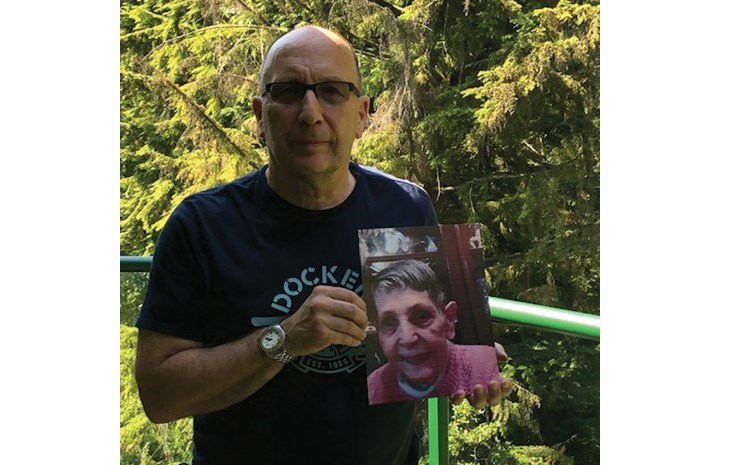A retired North Vancouver ambulance paramedic has been left struggling for answers after watching an overloaded system collapse when his mother died of heat exhaustion during the recent heat wave.
“It was so overloaded and taxed nothing happened as it really should have,” said Patrick Seline. “I understand it was a unprecedented heat wave. I’m just frustrated by the whole situation.”
Seline’s 88-year-old mother Irene Seline was one of hundreds of people who died, likely of heat-related illness, during the recent unprecedented heat wave.
Like the vast majority of people who died, his mom lived alone on the top floor of an older three-storey apartment building in Vancouver. It was where she felt comfortable, said Seline, and an environment she was almost always reluctant to leave.
Seline said he last talked to his mom on Sunday, June 27 – already one of the hottest days of the heat wave. “She was complaining about the heat,” he said.
A retired advanced life support paramedic, Seline told her she needed to drink lots of water, sit with a fan and cool herself down with wet towels.
On Monday, June 28, Seline phoned his mom again in the evening but there was no answer. That wasn’t unusual, he said, as she’d been having trouble with her phone. (He later learned that his mother had spoken with her regular cleaning lady that afternoon around 5 p.m.)
When he still couldn’t reach her the next morning, he asked the building manager – a longtime friend of his mom’s – to go and check on her.
The word came back quickly – his mother had died in her apartment.
Firefighters quickly arrived at the apartment, but determined there was nothing they could do.
Seline immediately rushed to the scene, where two police officers who met him said they’d called the ambulance service and coroner – required to officially declare the death and release his mom’s body.
Then they waited – in 40-degree heat.
“It was so hot in her apartment,” he said. “I had to turn off the fan because it was blowing hot air.”
“It took the coroner six and a half hours to return the call,” said Seline. The coroner then said she wasn’t coming. “They were too busy.”
Eventually the coroner asked questions of the police on the phone and gave them a case number allowing him to call the funeral home to take his mother’s body.
The whole experience has left him questioning the ability of an understaffed system to respond in a crisis. “You spend 37 years looking after people like that and when it comes your turn it all falls apart,” he said.
Seline said his mom had lived in the apartment for 35 years. “I had been trying to get her to the North Shore for years,” he said.
On two previous occasions, he found her beds in seniors’ homes, including independent and assisted living. At the last minute she refused to move, both times, he said.
It had always been difficult to get her to the North Shore for family events. During the pandemic, that just became harder he said.
If he’d asked her to leave her apartment for a few days, “She wouldn’t come,” he said.
“I didn’t realize her apartment was as hot as it was.”
Afterwards, Seline said he spoke to his mother’s doctor, who told him his mother likely died of heat exhaustion.
But because there was no official investigation, he’ll never know for sure.
“Did she have a heart attack? I don’t know. Did she have a stroke? I don’t know. There’s nothing I can do about it now after the fact.”
His mother had requested that there be no memorial service, he said.
Between June 25 and July 1, B.C.’s chief coroner Lisa Lapointe reported 719 deaths – about three times the usual number of sudden deaths for that time period.
Of those, 193 of the deaths were in the Vancouver Coastal Health region.
In comparison, B.C. saw just three heat-related deaths in the five years prior.
Most of the deaths were in the Lower Mainland, where air conditioning is less common and sky-high temperatures are unusual.
In a statement issued after the heat wave Lapointe wrote, “The coroners service will carefully investigate the circumstances of each death to determine the role extreme heat may have played and will use the findings of these investigations to help prevent future deaths in similar circumstances.”
Seline said he has no idea if his mother’s death will be among them.




